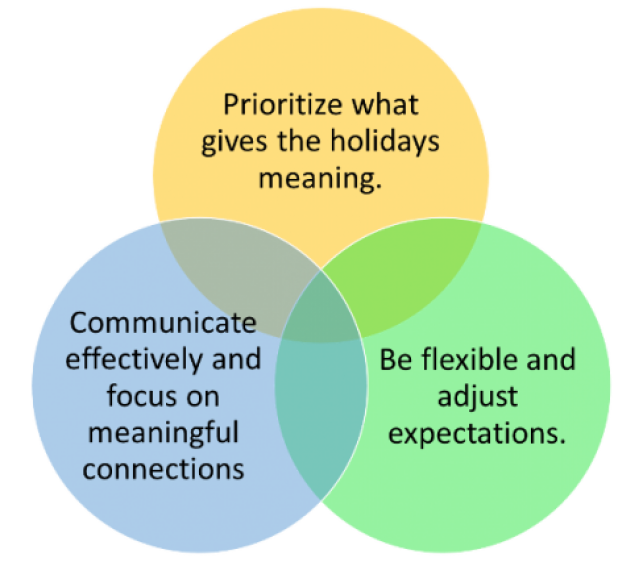By Pamela M. Dean, PhD, ABPP and Madeleine Werhane, PhD, MPH
Originally published: 12/21/2020. This guide can also be found on our webpage Dementia, COVID-19, and the Holidays: A Guide
The holidays can be a joyous, yet stressful time under typical circumstances. With the COVID-19 pandemic, this holiday season presents new challenges, especially for those who have a loved one living with cognitive impairment or dementia. While holiday activities may look very different this year, it is important to find creative ways to engage meaningfully with each other, whether that may be through virtual gatherings or the trusted old telephone. Below we discuss some special considerations to help adapt these strategies this holiday season to effectively connect with our loved ones living with cognitive impairment or dementia.
The Many Faces of Cognitive Impairment and Dementia
Cognitive impairment and dementia are general terms, both of which have to do with a breakdown in our thinking skills. While memory loss tends to draw a lot of focus, there are a broad range of thinking skills that we use to function in our day-to-day life. These skills include our ability to pay attention or concentrate, process information, speak to and understand others, perceive our world, and navigate space. They also include a variety of higher-order skills such as problem-solving, decision-making, planning, switching gears as situations change, juggling multiple tasks at one time, and inhibiting undesirable or unhelpful responses to situations.
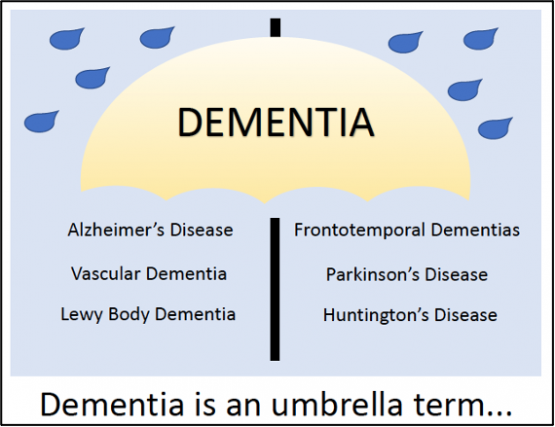
Courtesy, Pamela Dean
Cognitive impairment is a technical term that refers to a decline in our thinking skills. For some people, this is isolated to one thinking skill (e.g., memory), while for others it involves multiple thinking skills. For someone to have cognitive impairment, the decline in their thinking skill(s) must be beyond what is expected from normal age-related changes to the brain. It is important to note that a person can have cognitive impairment without dementia.
Dementia is umbrella term used by healthcare providers to refer to the progressive loss of thinking skills severe enough to interfere our ability to do basic tasks that are necessary for daily living. These include important aspects of managing our livelihood, such as taking care of the household, managing finances, or attending to health-related needs, such as taking our medications and keeping medical appointments. As dementia advances, it can impact one’s ability to take care of basic needs—such as eating, drinking, keeping oneself clean, dressing, and using the restroom.
There are many conditions that cause cognitive impairment and dementia. Depending on the type and stage of a condition, a person may experience very different difficulties and barriers to connecting with their loved ones during the holidays.
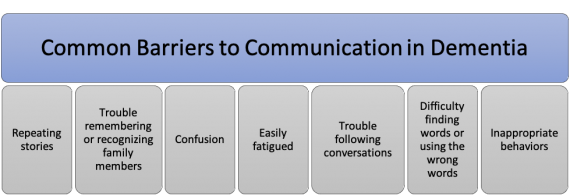
Courtesy, Pamela Dean
For example, a person with Alzheimer’s disease (AD), which is the most common type of dementia for people over age 65, may have difficulty connecting during celebrations because they quickly lose information that would otherwise be held in their memory. This can lead to a variety of challenges, including trouble following conversations, frequently repeating stories, confusing details and events from the past, and difficulty finding the words to express themselves. Very early on in AD, these difficulties may be more subtle, and represent more of a source of frustration for the person with AD rather than a noticeable change to their family. However, in advanced stages of the disease, a person with AD may no longer be able recognize their loved ones. They may start to interact with others on a more superficial level, making that person seem like a shell of their former self to their family members. This is very different picture than that of someone with a dementia associated with a disorder under the Frontotemporal Lobar Degeneration spectrum, which can create a whole different set of barriers to interacting with loved ones due to changes in language, personality, behavior, and/or motor functioning.
The many faces of cognitive impairment and dementia are important to remember when approaching the holidays, as the strategies you may choose to connect with your loved may differ based on the type of difficulties and dementia that they have.
Guiding Principles for Connecting Meaningfully During the Holidays
Below are some broad, overarching strategies for managing stress while maximizing enjoyment, meaningfulness, and human connection during this holiday season. While the pandemic presents some new and unique challenges and barriers—most of which have to do with modifying traditions and relying on technology—each of these “guiding principles” represents an approach that can be useful during any holiday season.
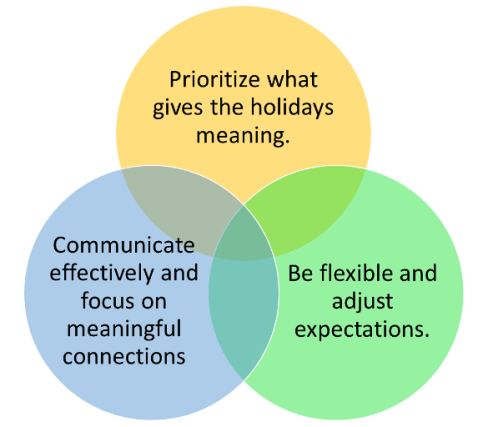
Courtesy, Pamela Dean
1. Prioritize what gives the holidays meaning
The holidays represent a busy time. Many of us are stretched thin juggling competing demands, including work deadlines, caring for children and other family members, and coordinating holiday events. Taking a step back and thinking about what truly matters to each of us—that is, what makes the holidays meaningful—can be extremely helpful.
Questions to ask yourself:
-
What holiday activities are the most meaningful to you?
-
What is it about each activity that is meaningful? What is the underlying value?
-
If you could only do one holiday activity, what would that be? Why?
-
For each holiday activity that you are planning, who is it for?
The answer to these questions can help each us identify which holiday activities to prioritize. They can also allow us to set aside or “let go” of activities that are a source of unnecessary stress.
Prioritizing Means Compromising: During the holidays, we often have to balance the wants and needs of multiple people. As such, most of us have to juggle our priorities with our loved ones. This means compromise. It also means making space within ourselves to accept that certain holiday activities and preferences will be prioritized over others. Ideal compromises are those that prioritize shared values, and typically involve creative solutions and effective communication between those involved.
For example, many people look forward to the holidays as a time to connect with family members. For some people, having a large family video conference is easy, minimally stressful, and enjoyable. However, for others, this might be extremely overwhelming. The stresses and frustrations of video conferencing technology for these people may outweigh the opportunity to connect. In these situations, a family may decide to forgo a large family virtual meeting, and instead prioritize other aspects of the holiday tradition. These could be as simple as making or ordering a favorite holiday food, setting the table, and just saying thanks.
Prioritize Tasks That Make Your Life Easier: You may choose to prioritize certain tasks that require more groundwork initially, but ultimately make the holiday celebration more manageable and enjoyable in the moment. Some examples include:
| Strategy | Example |
|---|---|
| Delegating tasks... |
|
|
Setting up the environment for the day of the holiday celebration... |
|
| Engaging in self-care... |
|
2. Be flexible and adjust expectations
Change is hard, and quite a lot is different this holiday season. Adjusting our expectations is an important way to keep disappointment and frustration from taking over special moments. This involves a combination of planning (that is, anticipating what needs to get done for a celebration, what could go wrong, and how to address that in advance) and being present during the actual celebration.
Here are some tactics that can help us to be flexible and adjust expectations:
-
Figure out what is realistic. This will help you identify boundaries that should not be crossed before, during, or after the celebration.
-
Plan for what you can. Think ahead and identify some potential barriers or problems that could arise and make it harder to connect during the celebration. Identifying these and troubleshooting before the event can help things to run more smoothly. Here are some areas to troubleshoot:
-
Problems with technology (e.g., difficulty operating a device, poor internet connection or receptions, delays in communication, limited battery power or needing to charge devices).
-
Sensory problems, including poor vision or difficulty hearing.
-
Distractions in the environment.
-
Fatigue, confusion, and/or irritability.
-
Conflicting activities in a daily schedule/routine.
-
-
Use strategies to stay grounded and present during the holiday event. Different strategies work for different people. Some common strategies include breathing exercises, repeating sayings or mantras, visualizing something calming, or focusing on connecting with your environment through your senses. Whatever you choose, it should be something that makes you feel more grounded in what really matters to you and your loved one on the day of the holiday event, even in the face of change and chaos.
-
Give yourself permission to feel what you feel. It is expected that you will feel a mix of emotions during this holiday season. Some emotions may be pleasant, while other may be less so. Making space to feel these emotions allows us to stay present in the moment.
Hope for the Best and Plan for the Rest
3. Communicate effectively and connect meaningfully
Whether you are corresponding with your loved ones via telephone, video conference, or in writing via email or snail mail this holiday season, effective communication is key for making those meaningful connections with our loved ones. Below are some tips that may help facilitate meaningful communication:
- Consider adapting conversation according to you loved one’s cognitive abilities and difficulties (Information is adapted from the Alzheimer’s Association resource Communication and Alzheimer’s.
| Treat the person with dignity and respect. Avoid talking down to the person with cognitive impairment or dementia or as if they are not there. Don’t exclude them from conversations. Speak directly to them rather than the caregiver or companion. | |
|
|
| Give the person plenty time to respond. Your loved one may need more time than others to process what was just said or to think of a response. | |
| Take time to listen to the person express their thoughts, feelings and needs. Don’t interrupt unless help is requested. Listen and try to find the meaning in what the person says. Repeat what was said to clarify. If they ask you the same questions over and over again, always repeat yourself as if it is the first time you are saying it. | |
| Avoid criticizing, correcting, or arguing. If the person says something you don’t agree with, let it be. Remember to focus on what is important, which is your time and connection with the person, rather than who is right. | |
| Use language that is rich with sensory information. Words to describe touch, sights, sounds, smells and tastes can help people connect with information on a deeper level. | |
| Encourage nonverbal communication. Use visual cues, such as hand gestures, as much as possible to enhance meaning. If you do not understand what the person is trying to say, ask them to point or gesture. Consider the feelings behind words or sounds that you loved one may make. Sometimes the emotions being expressed are more important than what’s being said. | |
|
Do not be afraid to... Not know what to say—your presence and having a moment of human connection are most important. Laugh—sometimes humor lightens the mood, makes communication easier, and allows us to connect. |
|
Strategy |
Example |
|---|---|
| Introduce yourself and where you are... | “Hi Grandma. This is Sally, in Seattle” |
|
Set the “agenda” for the interaction... |
“Each Grandchild is going to say hello and say one thing for which they are grateful.” |
| Take turns talking... |
One person talks first. When done, they call on next to share |
| Keep sentences simple with brief pauses... | “Hi Grandpa [pause]. I have something cool to share [pause]. I got a new car [pause]. It’s red!” |
| Show emotion through gestures... | Wave, thumbs up, hand on the heart. |
-
Focus on familiar ideas and topics that promote a feeling of connectedness.
-
For individuals experiencing memory loss, this may mean focusing on distant personal memory and events rather than more current issues (“First learned, last lost.”)
-
Use your judgement with respect to discussions involving controversial or stressful topics (see below).
-
-
If needed, have eyeglasses or other visual aids, hearing aids, headsets, and/or headphones ready for telephone calls or video conferences.
The pandemic has brought a host of new topics that may be challenging and stressful to discuss. While some people have strong and opposing opinions about the pandemic, economics, virtual schooling, and isolation, others may find common perspectives which can be a source of bonding. Therefore, it is important to use your judgement and if emotions seem to be heating up in the conversation, take the opportunity to redirect the topic.
Practical Tips for Planning Holiday Celebrations during the Pandemic
Even with social gathering restrictions due to the COVID-19 pandemic, there are a variety of holiday activities that can be done virtually or with those living in your household:
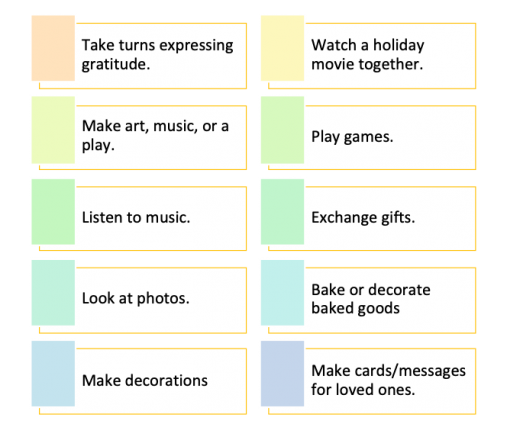
Courtesy, Pamela Dean
Planning a holiday celebration with someone with cognitive impairment or dementia
-
Consider the setting. Is your loved one living alone? Are they living at home with you or another caregiver? Are they staying at a hospital, skilled nursing facility, or another form of an assisted living facility? How you plan to connect with your loved one will largely depend on where they are living. If a person is not living with you, it may be helpful to drop off or send a care package so your loved one has the items with them. You may also consider doing a drive-by celebration, where you wave, blow kisses, sing, or even display holiday signs from your car. If your loved one is in a facility, ask staff about their policies around the holidays and if they can help deliver gifts or facilitate video/phone calls. Keep in mind if this will be too distressing/confusing to your loved one.
-
Be thoughtful of daily routines and schedules. It may be challenging, confusing, and/or distressing for your loved one to participate in holiday activities if they contradict their daily routine or interfere with their schedule.
-
Adapt holiday activities to video or phone: For example, you can draw or create artwork and hold it up to the camera to share. Some video platforms also allow you to screen share, so you can share pictures that you may have on your computer.
-
Consider challenges with technology. For some people with cognitive impairment or dementia, hearing voices over the telephone or seeing faces on a screen may be confusing. Use a modality to connect that you feel comfortable with trouble shooting and that your loved one will be able to connect through.
-
Involve the person with cognitive impairment or dementia as little or as much as they want with holiday planning and/or activities. This includes asking them which activities they want to do, who they want to connect with, and what communication modality they prefer. For many people, questions asked in yes/no or multiple-choice format will be easier to answer compared to open ended questions.
-
Watch for changes in behavior during the celebration. This can be a sign of discomfort or emotional distress, including feeling sad, overwhelmed, tired, or hungry. Use those cues as a sign to adjust the interaction.
Talking to Children About Dementia
With the pandemic, children may not be around their loved ones with dementia as often in order to protect their safety. Even so, children are far more perceptive than we often realize, and may see, but not fully understand the changes in their family member. Therefore, talking with children and involving them in holiday planning can help them to make sense of the emotions they may be feeling. Children can express their emotions differently than adults and behavior changes often can signal that there is something else going on. Here are a few things to look for:
-
Withdrawing from discussions or activities.
-
Being shorter tempered or more argumentative.
-
Experiencing physical pain (stomachache or headaches).
Sometimes, it can feel uncomfortable to talk to children about changes in our loved ones with cognitive impairment or dementia. You may feel like you do not know all the right things to say or have all of the answers to their questions. However, there are excellent resources available that can help to guide the conversation. First and foremost, it is important to be honest. This can mean sharing your own discomfort in seeing these changes or stating that you do not know the answer to their question(s). These conversations can help to normalize the feelings that a child may be experiencing, and also opens an important line of communication between you and your child regarding their loved one. If children are feeling uncomfortable to engage, follow their lead and let them have some space. Importantly, after the gathering, allow them the opportunity to express their feelings. Remember that, for some, this may come through as behaviors rather than words.
Resource: Parent Resources for Children (Alzheimer's Association)
Summary
We all know that holidays can be wonderful and stressful. This year has an extra layer with the stress of the COVID-19 pandemic and having to adjust our traditions and celebrations to stay safe. It is important to think about how we can make the most out of this holiday season by:
-
Prioritizing what matters most.
-
Being flexible and adjusting expectations.
-
Optimizing communication.
-
Finding ways to connect meaningfully.
-
Having grace for yourself….this is hard!
It is ok to grieve the loss of our typical holiday celebrations, or the changes we see in our loved ones with cognitive impairment or dementia. Its ok to feel sad, angry, or whatever it is that you feel. But, if those feelings are consuming and become the focus, that may cause us to miss out on being in the moment. Being present and enjoying what we have available to us now can help us to reframe how to get the most out of this holiday season. This is something that we think about in all aspects of life, but now more than ever with the COVID-19 pandemic, this brings this into a sharp focus.
About the authors:
Dr. Pamela Dean is a board-certified Clinical Neuropsychologist at the VA Puget Sound Healthcare System and Assistant Professor at the University of Washington, School of Medicine, in the Department of Psychiatry and Behavioral Sciences. Dr. Madeleine Werhane is a T32 postdoctoral fellow at the University of Washington, School of Medicine, in the Department of Psychiatry and Behavioral Sciences.
This guide can also be found on our webpage Dementia, COVID-19, and the Holidays: A Guide
